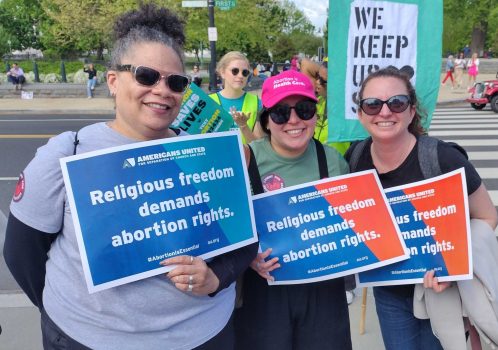
By Kalyn Mizelle McDaniel
Last week the U.S. Supreme Court heard arguments in Moyle v. United States, another case concerning abortion access. The court considered whether states like Idaho could prevent doctors from providing abortions that are necessary to prevent grave or debilitating harm to a patient.
The longstanding federal law, Emergency Medical Treatment and Labor Act (EMTALA), guarantees that emergency rooms will provide stabilizing treatment to anyone experiencing a medical emergency. The Idaho law being challenged creates an exception to this rule: when abortion is the medically recognized, necessary treatment, doctors must withhold care until the emergency progresses to the point at which the patient is risking death.
EMTALA was passed by Congress in 1986 to remedy the pervasive practice of “patient dumping” and ensure equal access to emergency medical care. Prior to its enactment, emergency rooms often refused care to patients who were determined to be unable to pay. Patients who could not afford treatment were being turned away from one hospital and wheeled down the street to another hospital, and often dying or experiencing severe complications in transit.
EMTALA’s requirement to provide stabilizing treatment to anyone seeking emergency care sought to remedy inequitable care. Its passage revolutionized emergency medicine. Stabilizing treatment is required when the denial of care would result in “placing the health of the individual in serious jeopardy,” “serious impairment to bodily functions,” or “serious dysfunction of any bodily organ or part.”
In certain instances where a patient presents with an “emergency medical condition,” the medically recognized standard of care is to provide an abortion. However, Idaho’s ban on abortion does not allow such stabilizing care until it is necessary to save the life of the pregnant person. There is a critical gap in the ability for a doctor to provide treatment between an emergency medical condition that, if not immediately treated, might impair one’s bodily functions or cause permanent disability and a medical condition that is deemed “necessary to prevent death.”
EMTALA is intended to ensure that anyone, anywhere in the country can walk into an emergency room and not be turned away if they are experiencing a medical emergency. Under draconian abortion bans with narrow or no exceptions, pregnant people do not have that guarantee. Requiring doctors to withhold or deny medically necessary treatment until the patient is necessarily risking death denies pregnant people, and only them, the full range of medically available emergency treatment — on the basis that they are pregnant.
Both Solicitor General Elizabeth Prelogar, who defended EMTALA before the court, and Justice Elena Kagan referred to what this second-class status relegation has meant on the ground in Idaho for pregnant people. In her opening argument, Prelogar pointed out that someone who arrives at an emergency room facing a grave threat, but not yet facing death, presents doctors with the choice of waiting for her to materially deteriorate or be airlifted to another state where necessary care can be provided.
Kagan referred to the exponentially growing number of airlifts from St. Luke’s, “the hospital that has the greatest emergency room services in Idaho.” It has been widely published that, in 2023, when the Idaho law was not in effect, only one patient was sent out of state for an emergency pregnancy termination from their emergency room. In the first three months of 2024, St. Luke’s airlifted six patients to neighboring states for emergency pregnancy terminations.
Doctors are facing years in prison for giving medically necessary abortions and the result is that these patients must be sent out of state to receive the care they need. Denying care on the basis of the patient’s identity is something wholly unfamiliar to modern emergency hospitals. However, it harkens back to the pre-EMTALA reality.
Abortion bans violate the separation of church and state by imposing one narrow religious viewpoint on everyone. Removing EMTALA protections from pregnant women goes a step further by advancing the Christian Nationalist commitment to relegating women to second-class citizenship. According to complementarianism, which is intrinsically intertwined with Christian Nationalism, cisgender woman have a distinct role. Motherhood and submission to men are key parts of the separate role women play. The incapability of the role is evidence of its second-class nature. Complementarianism is diametrically opposed to the liberation of women, and fittingly, limiting the instances in which their wellbeing can be protected in emergency rooms aligns with that ideology.
Whether the Supreme Court will protect the ability of pregnant people to have access to necessary care, or whether their decision will bolster states’ ability to relegate women to second-class status is yet to be seen. But it is critical that we do not lose sight of what is at stake.
Kalyn Mizelle McDaniel (she/her) is a member of AU’s Youth Organizing Fellowship program and a student at the University of Texas School of Law.